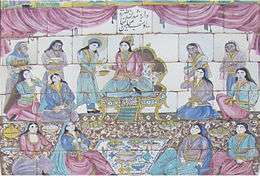Yusuf and Zulaikha



Yusuf and Zulaikha (يوسف زلیخا) is the Quranic verse of Yusuf (Joseph) and Zulaikha (the person known in the Bible as Potiphar's wife and whose name is not given there). It has been told and retold countless times in many languages spoken by Muslims, especially Persian and Urdu. Its most famous version was written in Persian by Jami (1414-1492), in his Haft Awrang ("Seven Thrones"). The story has by then many elaborations, and is capable of a Sufi interpretation, where Zulaikha's lust for Yusuf represents the soul's longing for God.
Other versions of the story
Other writers to have retold the story include: Mahmud Gami (Kashmiri). It is a standard tale used in Punjabi Qisse.
There exists as well a long poem on the subject, titled as Yusuf and Zalikha, which used to be attributed to Ferdowsi, the great Persian poet of the tenth and eleventh century, however, the scholars have rejected this book based on its low quality and the time line of Ferdowsi's life.[1]
Yousuf and Zulaikha in Asia
As in many other Muslim countries, the narrative of the epic love of Yousuf and Zulaikha was covered in classic literary works of East Bengal (modern day Bangladesh): in the 14th century A.D. (during the reign of Sultan Ghiyasuddin Azam Shah), Shah Muhammad Sagir wrote in Bengali a version of Yousuf and Zulaikha which is considered one of the greatest literary works of medieval "golden era" of Bengali literature.
Television
Pakistan's television channel A-Plus Entertainment produced serial, Mera Naam Yousuf Hai (My name is Yusuf) in 2015 loosely based on Haft Awrang by Jami.
References
- ↑ 'Yusuf and Zalikha: The Biblical Legend of Joseph and Potiphar's Wife in the Persian Version Ascribed to Abul-Mansur Qasim, Called Firdausi, ca. 932-1021 A.D.,' Edited by Hermann Ethé, Philo Press, Amsterdam, 1970
External links
| Wikisource has original text related to this article: |
- English translation of Jami's Joseph and Zuleika (edited by Charles Horne, 1917) PDF (138 KiB)
- Women Writers, Islam, and the Ghost of Zulaikha, by Elif Shafak